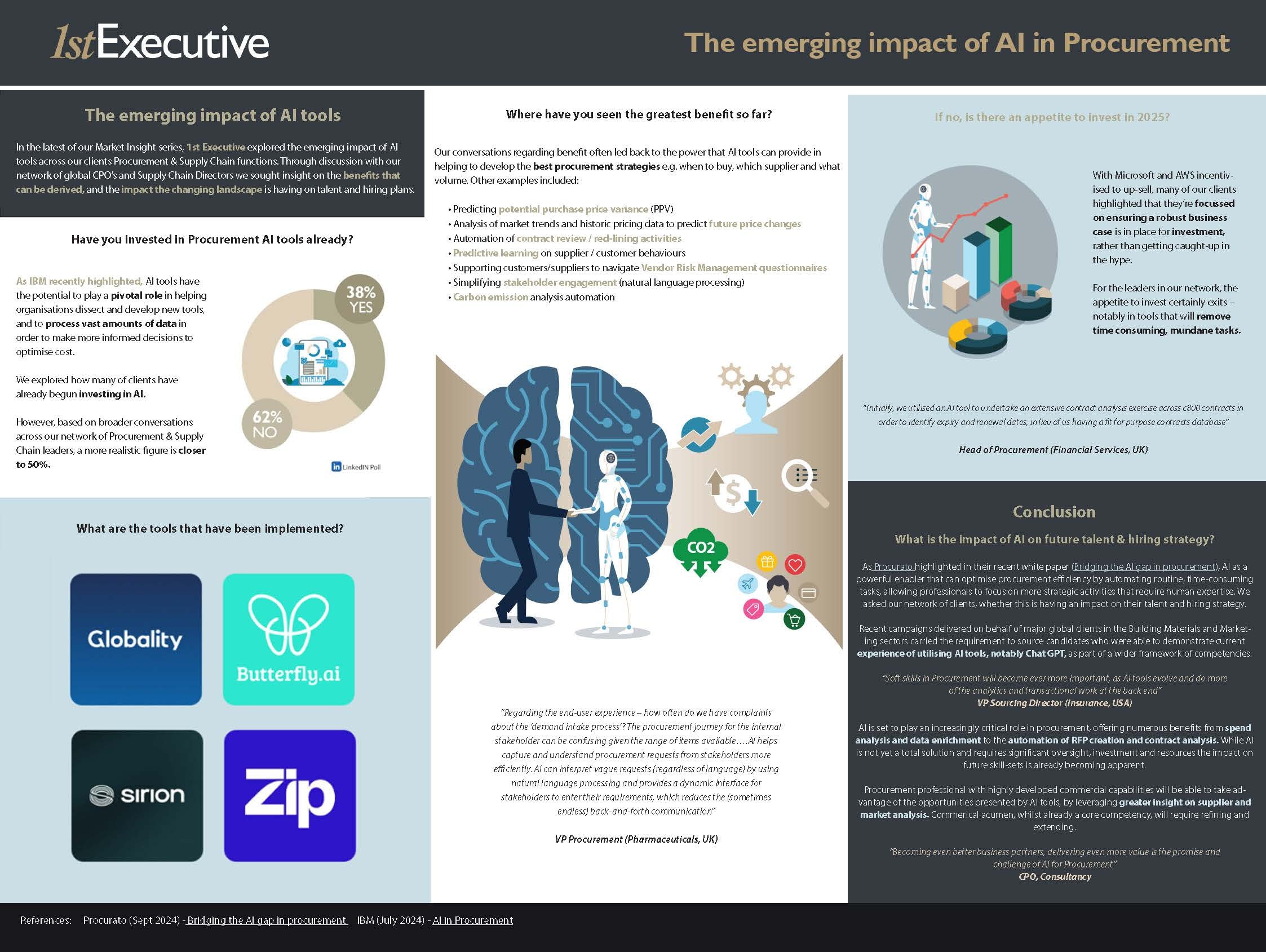October 2024 - The Emerging Impact of AI in Procurement

Richard Shelley
In September, 1st Executive explored the emerging impact of AI tools across our clients Procurement & Supply Chain functions. Through discussion with our network of global CPO’s and Supply Chain Directors we sought insight on the benefits that can be derived, and the impact the changing landscape is having on talent and hiring plans.
Have you invested in Procurement AI tools already?
As IBM recently highlighted, AI tools have the potential to play a pivotal role in helping organisations dissect and develop new tools, and to process vast amounts of data in order to make more informed decisions to optimise cost. We explored how many of clients have already begun investing in AI:
LinkedIN Poll:
38% = Yes
62% = No
However, based on broader conversations across our network of Procurement & Supply Chain leaders, a more realistic figure is closer to 50%.
What are the tools that have been implemented?
Sirion: The leader in AI Contract Management Software
Smart procurement starts with Zip | Zip (ziphq.com)
Where have you seen the greatest benefit so far?
Our conversations regarding benefit often led back to the power that AI tools can provide in helping to develop the best procurement strategies e.g. when to buy, which supplier and what volume. Other examples included:
Predicting potential purchase price variance (PPV)
Analysis of market trends and historic pricing data to predict future price changes
Automation of contract review / red-lining activities
Predictive learning on supplier / customer behaviours
Supporting customers/suppliers to navigate Vendor Risk Management questionnaires
Simplifying stakeholder engagement (natural language processing)
Carbon emission analysis automation
“Regarding the end-user experience – how often do we have complaints about the ‘demand intake process’? The procurement journey for the internal stakeholder can be confusing given the range of items available….AI helps capture and understand procurement requests from stakeholders more efficiently. AI can interpret vague requests (regardless of language) by using natural language processing and provides a dynamic interface for stakeholders to enter their requirements, which reduces the (sometimes endless) back-and-forth communication” VP Procurement (Pharmaceuticals, UK)
If no, is there an appetite to invest in 2025?
With Microsoft and AWS incentivised to up-sell, many of our clients highlighted that they’re focussed on ensuring a robust business case is in place for investment, rather than getting caught-up in the hype. For the leaders in our network, the appetite to invest certainly exits – notably in tools that will remove time consuming, mundane tasks.
“Initially, we utilised an AI tool to undertake an extensive contract analysis exercise across c800 contracts in order to identify expiry and renewal dates, in lieu of us having a fit for purpose contracts database” Head of Procurement (Financial Services, UK)
Conclusion:
What is the impact of AI on future talent & hiring strategy?
As Procurato highlighted in their recent white paper (Bridging the AI gap in procurement) AI as a powerful enabler that can optimise procurement efficiency by automating routine, time-consuming tasks, allowing professionals to focus on more strategic activities that require human expertise. We asked our network of clients, whether this is having an impact on their talent and hiring strategy.
Recent campaigns delivered on behalf of major global clients in the Building Materials and Marketing sectors carried the requirement to source candidates who were able to demonstrate current experience of utilising AI tools, notably Chat GPT, as part of a wider framework of competencies.
“Soft skills in Procurement will become ever more important, as AI tools evolve and do more of the analytics and transactional work at the back end” VP Sourcing Director (Insurance, USA)
AI is set to play an increasingly critical role in procurement, offering numerous benefits from spend analysis and data enrichment to the automation of RFP creation and contract analysis. While AI is not yet a total solution and requires significant oversight, investment and resources the impact on future skill-sets is already becoming apparent.
Procurement professional with highly developed commercial capabilities will be able to take advantage of the opportunities presented by AI tools, by leveraging greater insight on supplier and market analysis. Commerical acumen, whilst already a core competency, will require refining and extending.
“Becoming even better business partners, delivering even more value is the promise and challenge of AI for Procurement” CPO, Consultancy
References:
Procurato (Sept 2024) - Bridging the AI gap in procurement
IBM (July 2024) - AI in Procurement
